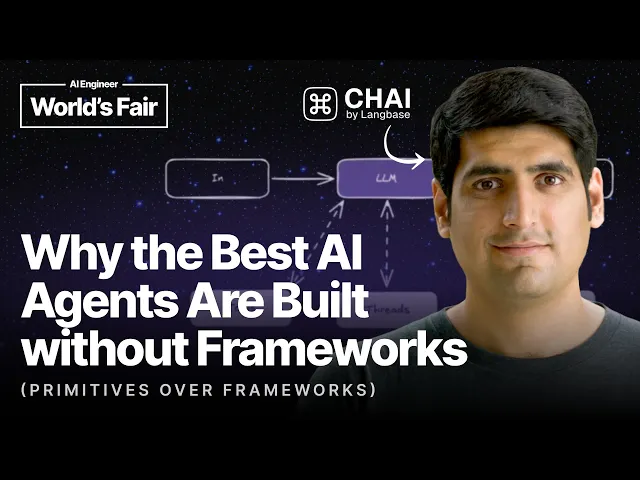Why the Best AI Agents Are Built Without Frameworks (Primitives over Frameworks)

Build better AI agents with primitives
In a recent keynote at the Cognitive Human-Agent Interaction (CHAI) conference, Ahmad Awais articulated a compelling vision for AI agent development that challenges the prevailing wisdom of framework-first approaches. His presentation cut through the hype that surrounds many AI conversations today, focusing instead on a foundational principle that may reshape how developers build the next generation of AI systems. At its core, his message was deceptively simple yet profound: primitives trump frameworks when creating truly effective AI agents.
The essence of Awais's argument lies in recognizing that AI development faces a critical inflection point. As he meticulously explained through his own journey building AI agents, the most robust systems emerge not from rigid frameworks but from flexible, purpose-built primitives that allow developers to construct exactly what they need. This approach addresses a fundamental tension in software development—the trade-off between convenient abstractions and the control necessary to build truly innovative solutions.
- Primitives provide essential flexibility that frameworks often sacrifice for convenience, allowing developers to construct purpose-built solutions rather than forcing their requirements into predetermined patterns
- Current AI frameworks create unnecessary constraints by imposing opinions and structures that may not align with the specific problems developers are trying to solve
- The "primitives-first" approach enables more resilient systems that can evolve with emerging technologies rather than becoming obsolete when frameworks fall out of favor
- Real innovation happens at the primitive level, as demonstrated by Awais's work on DevOps.ai, where building from first principles led to more powerful and adaptable solutions
The most compelling insight from Awais's presentation was his distinction between "playing house" with AI frameworks versus doing the substantive work of building meaningful solutions from primitives. This perspective matters tremendously in our current AI landscape, where flashy demos and framework-dependent solutions often mask fundamental limitations. By focusing on primitives—the basic building blocks from which more complex systems can emerge—developers gain the ability to create solutions that actually solve real problems rather than merely demonstrating capabilities within artificially constrained environments.
When examining this approach in context, it's clear that Awais's philosophy aligns with broader shifts in software development. The industry has repeatedly witnessed cycles where frameworks rise to prominence before eventually constraining innovation, only to be replaced by new approaches built on
Recent Videos
How To Earn MONEY With Images (No Bullsh*t)
Smart earnings from your image collection In today's digital economy, passive income streams have become increasingly accessible to creators with various skill sets. A recent YouTube video cuts through the hype to explore legitimate ways photographers, designers, and even casual smartphone users can monetize their image collections. The strategies outlined don't rely on unrealistic promises or complicated schemes—instead, they focus on established marketplaces with proven revenue potential for image creators. Key Points Stock photography platforms like Shutterstock, Adobe Stock, and Getty Images remain viable income sources when you understand their specific requirements and optimize your submissions accordingly. Specialized marketplaces focusing...
Oct 3, 2025New SHAPE SHIFTING AI Robot Is Freaking People Out
Liquid robots will change everything In the quiet labs of Carnegie Mellon University, scientists have created something that feels plucked from science fiction—a magnetic slime robot that can transform between liquid and solid states, slipping through tight spaces before reassembling on the other side. This technology, showcased in a recent YouTube video, represents a significant leap beyond traditional robotics into a realm where machines mimic not just animal movements, but their fundamental physical properties. While the internet might be buzzing with dystopian concerns about "shape-shifting terminators," the reality offers far more promising applications that could revolutionize medicine, rescue operations, and...
Oct 3, 2025How To Do Homeless AI Tiktok Trend (Tiktok Homeless AI Tutorial)
AI homeless trend raises ethical concerns In an era where social media trends evolve faster than we can comprehend them, TikTok's "homeless AI" trend has sparked both creative engagement and serious ethical questions. The trend, which involves using AI to transform ordinary photos into images depicting homelessness, has rapidly gained traction across the platform, with creators eagerly jumping on board to showcase their digital transformations. While the technical process is relatively straightforward, the implications of digitally "becoming homeless" for entertainment deserve careful consideration. The video tutorial provides a step-by-step guide on creating these AI-generated images, explaining how users can transform...
